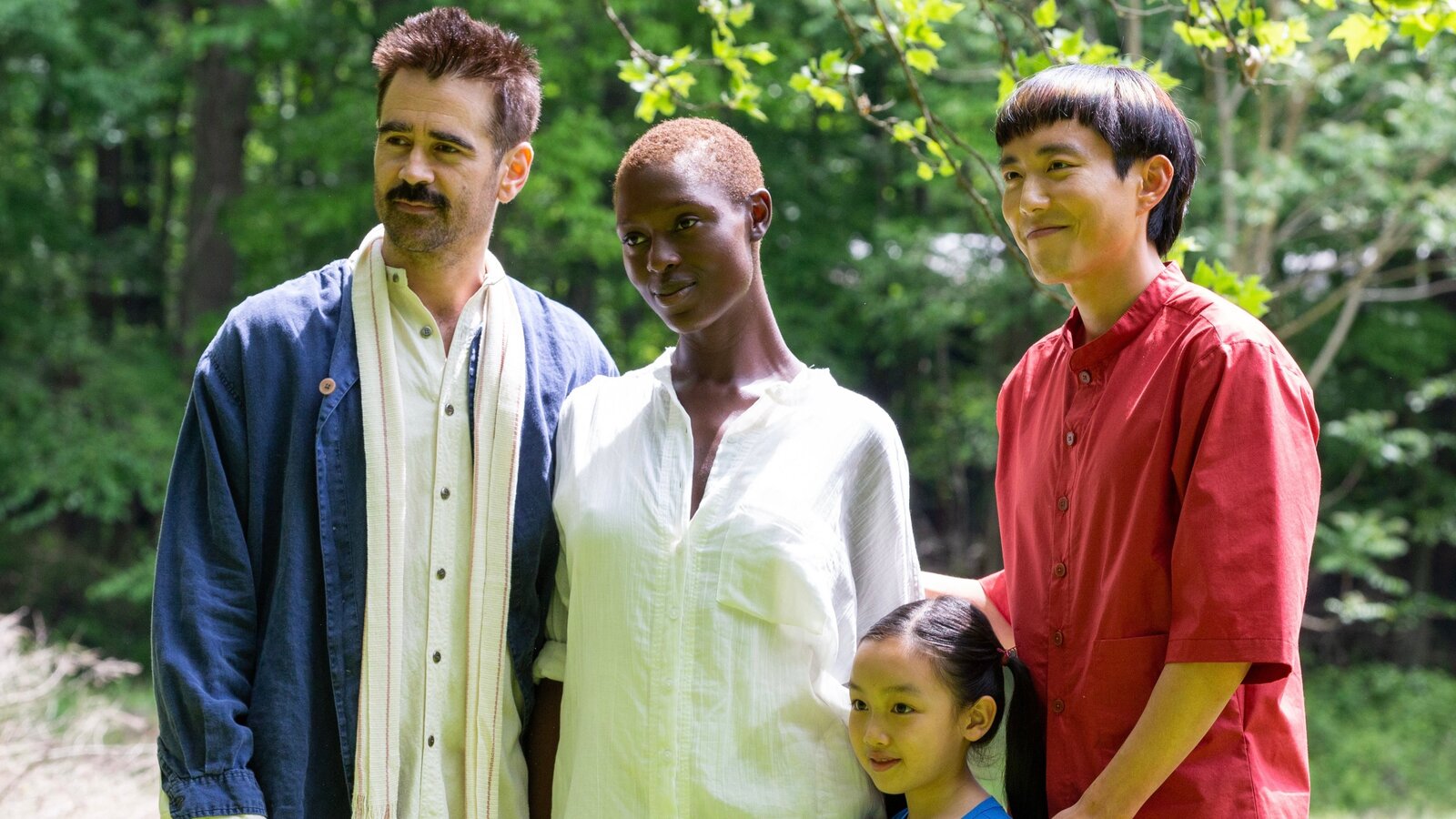The 2nd Feature from a director who’s made a brilliant first film always makes me giddy. You’re dreading an Elysium post District 9, but if the director is as good as you think they are, you’re more excited the result is going to be a Little Women, Us, or Pulp Fiction. Kogonada, a one name revelation, took a strangely architected Midwestern town and turned it into an ephemeral treatise on arrested development in 2017. His “Pulp Fiction” is After Yang, a more ambitious, impressive 2nd movie, proving this guy is no fluke, and streaming services should be lining up to partner with this guy. Because all he’s going to do is make impressive stories for you.
The Yang (Justin H. Min) in the title is an android/robot, and part of of a family of 4. Jake (Colin Farrell) and Kyra (Jodie Turner-Smith) chose to adopt Mika (Malea Emma Tjandrawidjaja) from China, and bought Yang from a robotic resale shop to help Mika connect with her Chinese heritage. After some family dance bonding, Yang breaks down, traumatizing Mika. Breadwinner Kyra has to work, so she gets Jake to figure out how to fix Yang, to help Mika feel better, inadvertently leading him into all sorts of questions and revelations about Yang, himself, and his family.
Plato godfathered the phrase “Necessity is the mother of invention.” Nowhere is that phrase more apt than low budget science fiction, which After Yang wholeheartedly is. Kogonada’s script is ambitious: he touches on all sorts of science fiction themes that make it easy to see a version of After Yang requiring hundreds of millions of dollars for CGI shootouts, battles, robots, etc. Clearly Kogonada doesn’t have the budget for that, so he strips away the giant version of the script, in favor of a smaller story reliant on clever direction, Kogonada’s best asset. His future vision is simple but fascinating. The outfits and set design help transport the user to a different time, but not so different we feel unattached. Kogonada’s directorial style wraps the movie in this dreamlike gauze that makes the audience feel simultaneously detached but comforted, the perfect tone for this story. Most importantly, technology/CGI is deployed in the movie smartly: the director frames phone calls like an on hold Zoom meeting, ready to pop up when you need them helping establish the world around the characters for example. Self driving cars give us more time to talk in the backseat to and from locations. Kogonada reminds everyone that small budget sci-fi doesn’t mean you can’t be breathtaking though; in one spectacular sequence, a pair of glasses can be used to explore a lifetime of memories, conveying those big ideas in a simple package, all over his clever script.
And that script contains a multitude. I watched in wonder as the simple deactivation of a robot brother could open such a world of ideas and emotions. The concept of memory is wonderfully discussed, showing the host of factors that lead to people remembering things: time, place, smell, taste, emotion, nostalgia, etc. Even though Yang has stored millions of facts about China to tell little Mika, he “learns” (aided by Kogonada’s lovingly put together montages with a swoony piano score) what keeps those facts alive and powerful. Which smoothly leads into Kogonada’s study of Artificial Intelligence. His view is less diabolical and explosion reliant like movie studios are used to with AI, instead grounding Yang’s evolution via his emotional awakening, as seen through his relationships with Colin Farrell, Jodie Turner-Smith, Malea Emma Tjandrawidjaja, and Kogonada muse Haley Lu Richardson. Through conversations about tea, butterflies, and coffee/concerts, Yang transforms from a robot into something not quite human, but not what he was programmed to do. This AI discussion then leads him to those self realized discussions we all have: characters talk about the after-life, death, moving on, etc, inadvertently turning the story into a discussion about the frayed family at its center, coping with the loss of their brother/love and figuring out how to move on without them. Like all dreams/memories, After Yang gently takes us on this journey, holding our hand as we calmly navigate though a lifetime of people, places, emotions, and things in just a short blink of an eye.
So, Netflix, Amazon, HBO Max, Hulu, the ball’s in your court. Kogonada is a free agent, and you have a chance to sign one of the more interesting filmmakers working today, as his brilliant After Yang makes him a resounding 2 for 2. With my luck, that means he’ll direct Hawkeye 5 or something like that for Marvel, but as After Yang taught me, I can hope for something more meaningful, and worst case, my memories of this film will constantly be there to remind me how lucky I am to live a life!

